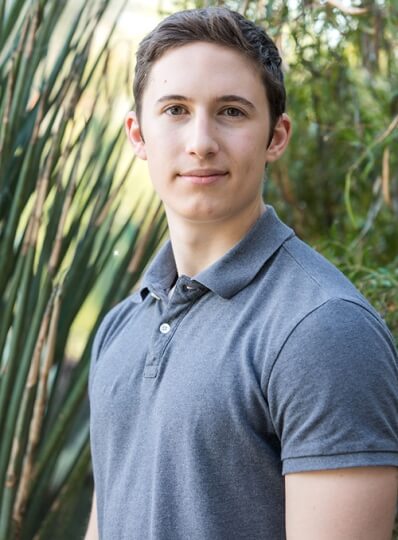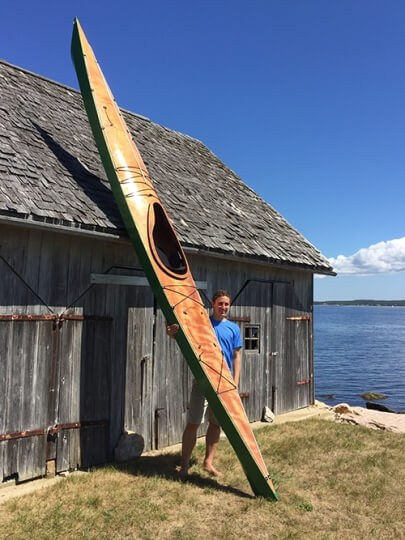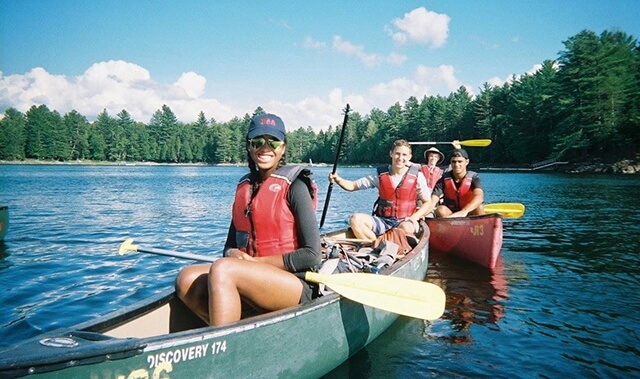Luke Melas-Kyriazi, A.B. /S.M. '20, is applying algorithms to blood measurements in an effort to predict patient demographic information (Photo provided by Luke Melas-Kyriazi)
When the results of a blood test reveal that a patient’s white blood cell count is within the “normal” range, a physician may decide to change or stop the treatment regimen.
In medicine, “normal” results are typically considered a good thing, but what is “normal” anyway?
“These reference ranges are hugely important for diagnosis, but many of them are relatively understudied, especially across demographically diverse populations,” said Luke Melas-Kyriazi, A.B./S.M. ’20, a math concentrator pursuing a computer science master’s degree at the Harvard John A. Paulson School of Engineering and Applied Sciences. “Using machine learning techniques, we’ve found that these reference ranges vary widely between different demographic groups.”
Working at the Harvard Medical School and Boston Children’s Hospital, 2020 Rhodes Scholar Melas-Kyriazi is applying algorithms to these blood measurements in an effort to predict demographic information. He hopes that, by providing new insights into reference ranges that haven’t been reconsidered in decades, he and his colleagues could help improve diagnosis and treatment for patients.
It’s a complex problem, and one that involves a massive amount of patient information that can be difficult to obtain in the first place. The biggest challenges he and his collaborators face involve cleaning and aggregating enormous data sets; work that must be completed in meticulous detail before their research can even begin.
“This is an exciting area of research, and machine-learning is applicable to a lot of problems that weren’t tractable before,” he said. “I hope this research makes a difference and helps patients, and that it also improves some things in the broader computer science community.”
Melas-Kyriazi with a kayak he built while in high school. (Photo provided by Luke Melas-Kyriazi)
For Melas-Kyriazi, an interest in helping the community fostered his initial passion for computer science. As a New York City high school student, he completed community service requirements by raking leaves in Central Park. But Melas-Kyriazi, who’d taken an interest in web development, saw his school’s community service program as a way to do more.
So he started a student club to make websites for local nonprofits.
Seeking to learn new skills so he could build better websites, he took Introduction to Computer Science (CS50) online while he was in high school. Even though the course showed him how much fun computer science could be, he came to Harvard planning to study physics instead. Then a Youtube video changed his mind.
The video described research by a University of Illinois at Urbana-Champagne Ph.D. student that used deep neural networks to tackle image matting, a problem in computer graphics.
“That totally blew me away. I started to learn about this amazing world of computer vision and machine learning,” he said. “Computer vision and natural language processing are areas where you can really see and feel your work. It really comes alive.”
Melas-Kyriazi dove deeper into research and began working on a project in longform image captioning with Alexander Rush, a former Assistant Professor of Computer Science who recently moved to Cornell Tech. Melas-Kyriazi used machine learning techniques to produce detailed image descriptions, a multimodal task that challenged him to combine computer vision and natural language processing.
That project led to his work at the Harvard Medical School and, with the rapid growth of the machine learning community, Melas-Kyriazi expects it to open other doors to brand new research projects.
Melas-Kyriazi canoes with fellow students during freshman orientation. (Photo provided by Luke Melas-Kyriazi)
“The field moves incredibly quickly, and that makes it very hard to keep up, but that also means that it is very vibrant and very exciting,” he said. “There is an attitude that a step forward for one group is a step forward for the community, and the community is really working together to solve difficult problems.”
He’s planning to dig even deeper into those problems at Oxford University. Melas-Kyriazi intends to pursue a Ph.D. in computer science or engineering, studying how natural language processing, computer vision, and machine learning can be applied to multifaceted problems that researchers haven’t been able to tackle before.
Though he’s unsure whether his path will lead him into academia, government, or entrepreneurship, Melas-Kyriazi is excited to use his skills to make an impact.
“The biggest lesson I’ve learned is that the people you work with make all the difference in the world. Finding people who will support you, but also challenge you, is essential,” he said. “I’m really thankful for the people I’ve grown to know here at Harvard, and being able to study and work with them. I’m excited to see where all this leads.”
Press Contact
Adam Zewe | 617-496-5878 | azewe@seas.harvard.edu


